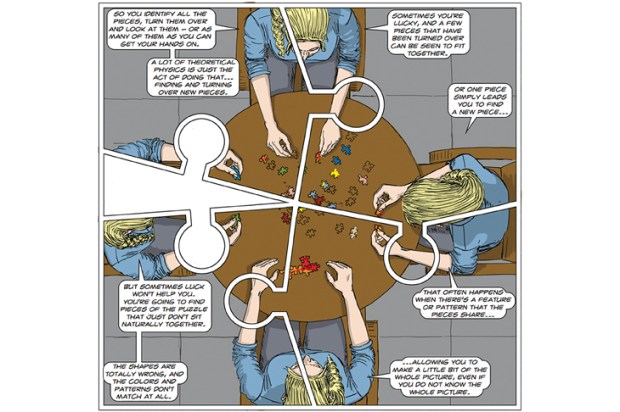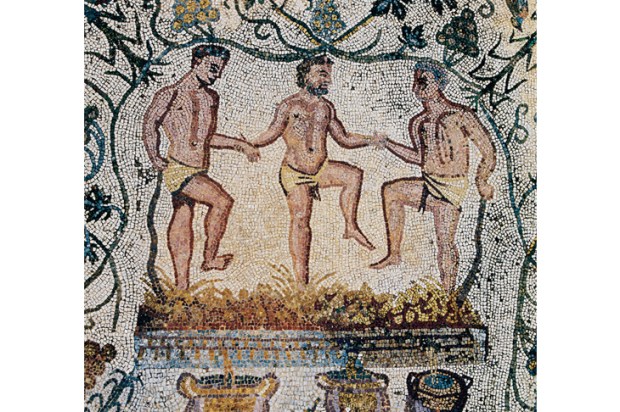On the wall of her tumbledown house in central Baghdad, an elderly Christian widow named Elishva has a beloved icon of St George with his lance raised. She chats with the saint like an old friend, but wonders why, in the picture, he stays frozen mid-thrust and why ‘he hadn’t killed the dragon years ago’. As her ravaged city suffers an interminable ‘binge of death and devastation’, Elishva frets that ‘everything remained half-completed’, three years after the Anglo-American invasion of Iraq in 2003. During the blood-soaked interregnum, which continues to this day, monsters breed.
Out of this limbo of unfinished business, from a people suspended in agony between present and past, life and death, Ahmed Saadawi has wrenched a fable that puts a cherished Romantic myth to urgent new use. In 2014, this novel won the International Prize for Arabic Fiction (the ‘Arabic Booker’). With Baghdad still scourged by sectarian violence, it now appears in Jonathan Wright’s salty, pacey translation. In their bicentenary year, Mary Shelley’s scientist and his creature will take plenty of contemporary spins. Surely, no updated journey will be more necessary than Saadawi’s.
He tells a nightmarish, but horridly hilarious, tale of a vengeful ghoul stitched from the body parts of victims daily slain by limb-shredding suicide bombs in a city that reeks of ‘smoke, the burning of plastic and seat cushions, the roasting of human flesh’. Our cut-price Dr Frankenstein is the junk dealer Hadi, who lives next door to Elishva in a ramshackle ‘Jewish ruin’. Saadawi gently reminds us of the Jews who fled Baghdad, and the Christians fleeing now — Elishva’s scattered family keep in touch via Father Josiah’s cellphone. ‘Decades of disaster’ have hollowed out this city’s soul.
From the dismembered chunks he scavenges, Hadi builds his ‘composite of victims’ — called Daniel after the son Elishva lost to Saddam’s tyranny. Animated by the soul of a hotel guard killed in an explosion, Daniel (or ‘the Whatitsname’) goes on a Schwarzenegger-style rampage. It, or he, pursues rough justice for Baghdad’s unnumbered corpses, ‘seeking to avenge their deaths so they could rest in peace’. Not without vanity, the Whatitsname comes to believe that ‘I’m the only justice there is in this country’.
Journalists, such as the harassed Mahmoud whose misadventures supply a slightly convoluted sub-plot, hype the celebrity terminator. Devotees worship him as ‘the face of God on Earth’. The creature runs out of obvious targets because ‘the criminals and victims were entangled’. Brutal civil war transplants guilt into innocence — and vice versa. Meanwhile, Brigadier Majid and a hush-hush unit devoted to weird crimes and ‘superstitious rumours’ (he employs a pair of squabbling astrologers) struggle to track down the undead enforcer.
Sinister, satirical, ferociously comic but oddly moving, Frankenstein in Baghdad is a bit of a patchwork creature in itself. Its twin limbs of grotesque fantasy and grainy realism don’t always march in sync. Yet the myth holds firm, and the metaphors strike hard. The Whatsitsname becomes an image of ‘whatever lurked in people’s heads, fed by fear and despair’. British and American readers, whose politicians helped hatch Iraq’s latest monster, will find its face in here.
Got something to add? Join the discussion and comment below.
Get 10 issues for just $10
Subscribe to The Spectator Australia today for the next 10 magazine issues, plus full online access, for just $10.
You might disagree with half of it, but you’ll enjoy reading all of it. Try your first month for free, then just $2 a week for the remainder of your first year.














Comments
Don't miss out
Join the conversation with other Spectator Australia readers. Subscribe to leave a comment.
SUBSCRIBEAlready a subscriber? Log in